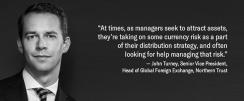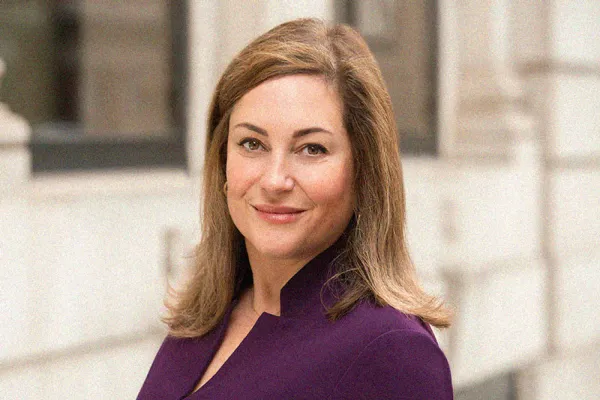Managing foreign currency exchange (FX) is an unavoidable challenge for asset managers in a global marketplace. There was a time when asset managers might have felt that by outsourcing FX they were surrendering best of breed execution capability. But as FX has become increasingly complex and costly, managers have begun to recognize that it isn’t core to the value they provide to their clients, and that, in fact, they may improve their overall performance and reduce costs by embracing outsourced FX solutions. This evolving perspective and the benefits that emerge when asset managers outsource FX were the subjects of discussion when II sat down with Northern Trust’s John Turney, Senior Vice President, Head of Global Foreign Exchange, and Marc Mallett, Director of Strategy for Asset Servicing, Americas.
Why is demand for FX solutions on the rise globally?
John Turney: We’re seeing demand for holistic solutions as opposed to siloed demand for risk transfer, liquidity, and pricing. In the past, conversations typically revolved around macroeconomics, rates, or market structure. Now, there is much more focus on process design management, and optimization. It has evolved into a much more operationally intensive discussion as people evaluate their approach to execution.

What’s driving that shift in the conversation?
Turney: In part, the answer is the ongoing electronification of the market. FX hasn’t quite reached the levels of the equities market in that sense, but the increase in electronic trading has brought with it a sense of stability and maturity around price discovery and transparency. After seeing the effects of those improvements, people are looking beyond execution for improvement in the process. In general, as workflow becomes more efficient, opportunities for improvement move up in the investment process from the point of execution.
Marc Mallett: Investment managers are always looking to identify functions that are not alpha generators, and when they find them they’re looking for somebody else to take them on so that they – the asset manager – can focus on what really matters. I think FX is falling along that continuum, with asset managers really focusing on what separates them from their competitors and allows them to deliver value to their clients. If FX trading is not core to an investment manager’s process, nor viewed as a source of alpha generation, then the question becomes how do you manage the downside risk most efficiently? The answer in many cases is to have someone else do it for you.
Turney: I think, too, that many of our clients are looking at currency in the context of broadening their cross-border distribution through currency hedge share classes or taking on hedge currency portfolios for separately managed accounts, and things like that. At times, as managers seek to attract assets, they’re taking on some currency risk as a part of their distribution strategy, and often looking for help managing that risk.
The widely varied global regulatory requirements for currency trading must add to the complexity of what asset managers are looking for an FX solution to address, yes?
Turney: They do, and it ties back to how the execution landscape is changing. From the starting point of transparency, there is a more holistic conversation around how our clients go about measuring execution quality, and linking that back into the overall investment process. We’ve seen significant growth in algorithmic execution as clients seek greater liquidity and transparent execution. The challenge in a global and OTC marketplace is that you can be dealing with multiple regulatory regimes. Your clients operate within their regulatory regime, you as the provider are operating under another regime, and then you may be executing trades in a third. The trade reporting element to that has a massive workflow – a lot of rule mapping and static data maintenance to track regulatory compliance through your global operation. As you can imagine, that puts a significant load on the underlying technology infrastructure that supports the business, and is a challenge many asset managers would like someone else to help solve for them.
From an asset manager’s perspective, what are some of the signals that should tell them an outsourced FX solution is something they should seriously consider?
Turney: If they aren’t seeing incremental value beyond the associated costs and risks of FX trading, then it’s taking focus away from their core mission, and that’s an immediate red flag.
Another thing to consider is your ability to keep up with how the marketplace is evolving: the technology, the scale, the compliance. Are there outsourcing solutions that can help you close some of those gaps, so you don't have to do it on your own? There are certainly some market participants and managers that operate at a scale that allows them to quite readily internalize those costs, but for a large segment of the asset management world, the cost versus value proposition is a much more relevant question that requires investigation.
Mallett: Recently published research* on the spending on buy-side trading desks, and in particular in foreign exchange, indicates that in 2018 there was a 15% increase in the cost of running a buy-side FX trading desk. When you combine that with the questions of adding value or alpha for your clients, the increasing cost of a sustained effort to do FX trading well, and the necessity to keep up with your peers, that’s when you really need to be asking how you can leverage new capabilities, new technologies, and new offerings that are available.
That’s a dramatic increase in the cost of running buy-side desks internally.
Mallett: It’s serious. There are increases in market data and technology costs, but the largest factor in the rising cost of running a desk is the staff.
Turney: That touches on the fact that the foreign exchange market is operating 24 hours a day. For global managers, that raises a scale question. If a regional manager, for example, doesn’t have fully built out 24-hour trading capability, they may already be outsourcing in part with a service provider to cover market sessions where they’re not fully staffed. If you’re already comfortable doing that for a portion of your business, you have to ask yourself what potential benefits you would derive if you outsourced all of it and redeployed those internal resources toward other areas where you deliver more value to your client. It is a mindset change but, to an extent, people are already doing it.
What are the key elements of Northern Trust’s holistic FX global outsourcing solution?
Turney: There are three aspects of our outsourcing solution. First, our currency management product is a holistic tool for currency overlay that supports portfolio overlay, share-class hedging, and look-through hedging for currency-hedged share classes. Second, we have a service called Complete FX™, which is a standalone FX outsourcing service with multiple features. This leads to our third model which ties into our Integrated Trading Solutions capability on the brokerage side. That’s where we, as a service provider, facilitate brokerage execution, middle office functionality, and FX execution related to those securities transactions. Depending on the client need, we can mix and match different components of our middle office services platform. We’ve been in the FX outsourcing space for well over a decade; the service started as an extension of our broader middle office outsourcing service.
How do you determine which solutions are the right fit for a given client?
Turney: It’s typically driven by their operational workflow. How and when can they generate foreign exchange transactions? What are their system capabilities in terms of order management systems? We’ll have conversations about things like that because there are different approaches that we can take to provide connectivity and consume inbound data to generate FX transactions for execution.
Then the conversation will evolve to looking at how they tend to trade and manage the portfolio. Do they do a lot of rebalancing within countries of exposure? Are they a little more tactical and reallocate the portfolio in and out of different currency exposures? Do they frequently move out of different currency pairs, where they need to execute as quickly as possible to minimize market risks by reducing latency in the program since there are not many netting opportunities?
We’ll have those conversations with clients and then look to optimize the execution program based on how they’re managing their portfolio and what their system environment can support. That’s where we’ll bring in our middle-office solutions colleagues to provide opportunities to further streamline the end-to-end trade lifecycle.

And as those conversations take place, do more opportunities to create operational and cost efficiencies emerge?
Mallett: Yes, as we start down the path those conversations create, within the broader context of outsourcing solutions, we arrive at how they can gain some operational efficiencies, maybe gain access to better liquidity. These things can be done with minimal effort and time to market. Over time, as the relationship becomes more consultative and we learn more about their business, we have the ability to leverage a more holistic service offering through, for example, our Integrated Trading Solutions and middle office outsourcing. The more they can simplify the things that they have control over, the greater the cost and operational efficiency to be gained. A holistic service solution that reduces the number of counterparties and noise involved clearly comes with cost benefits. Moreover, simplification can drive better performance, and ultimately that’s what our clients are after.
*Greenwich Associates, “The Buy-Side Spending Battle: Compensation vs. Technology, 2019
© 2019 Northern Trust Corporation. Head Office: 50 South La Salle Street, Chicago, Illinois 60603 U.S.A. Incorporated with limited liability in the U.S. Products and services provided by subsidiaries of Northern Trust Corporation may vary in different markets and are offered in accordance with local regulation. This material is directed to professional clients only and is not intended for retail clients. For Asia-Pacific markets, it is directed to expert, institutional, professional and wholesale investors only and should not be relied upon by retail clients or investors. For legal and regulatory information about our offices and legal entities, visitnortherntrust.com/disclosures. The following information is provided to comply with local disclosure requirements: The Northern Trust Company, London Branch; Northern Trust Global Investments Limited; Northern Trust Securities LLP. Northern Trust Global Services SE, 6 rue Lou Hemmer, L-1748 Senningerberg, Grand-Duché de Luxembourg RCS B232281; Northern Trust Global Services SE UK Branch, 50 Bank Street, London E14 5 NT; Northern Trust Global Services SE, Abu Dhabi Branch, registration Number 000000519 licenced by ADGM under FSRA # 160018. The Northern Trust Company of Saudi Arabia - a Saudi closed joint stock company - Capital SAR 52 million. Licensed by the Capital Market Authority - License No. 12163-26 - C.R: 1010366439. Northern Trust Luxembourg Management Company S.A., 6 rue Lou Hemmer, L-1748 Senningerberg, Grand-Duché de Luxembourg, Société anonyme RCS B99167. Northern Trust (Guernsey) Limited (2651)/Northern Trust Fiduciary






